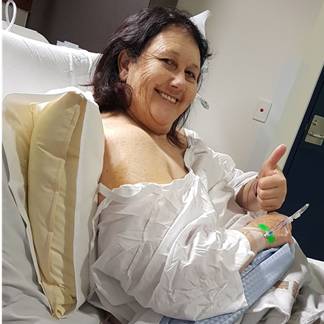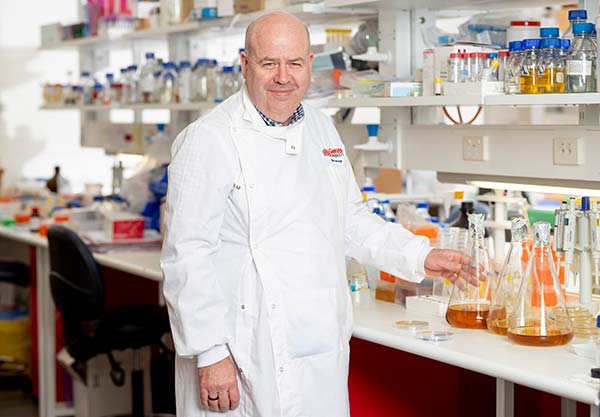The Victorian Cancer Biobank has been given $6 million in Victorian Government funding, through the Victorian Cancer Agency, for its vital work over the next three years.
Funds will be used to continue the ethical collection of cancer tissue and blood biospecimens, and clinical data for research studies and clinical trials.
The Victorian Cancer Biobank is an open-access, not-for-profit tissue resource to provide cancer researchers with a diverse selection of high-quality biospecimens and derivatives, comprehensively annotated with de-identified clinical outcome data.
With more than 450,000 biospecimens, the Victorian Cancer Biobank is one of the largest cancer biobanks in Australia and has supported more than 300 research projects since its inception in 2006.
A vital donation
 Mernda resident Wendy Harrold, 63, donated her breast tissue to the Victorian Cancer Biobank after a preventative double mastectomy and reconstruction.
Mernda resident Wendy Harrold, 63, donated her breast tissue to the Victorian Cancer Biobank after a preventative double mastectomy and reconstruction.
Wendy lost her mum to breast cancer 42 years ago – she was just 17 when her mum was diagnosed, and only 22 when she died.
“Watching my mum go through a mastectomy and radiation I knew I never wanted to go through that myself. It was a horrific experience for a young girl to witness,” Wendy said.
In the early 2000’s, Wendy went to the Peter MacCallum Cancer Centre to be tested for the BRCA gene. Unfortunately, genetic testing was very expensive at the time, and without a strong family history of breast cancer to Wendy’s knowledge, she was unable to be tested. It was then that Wendy heard about Lifepool, a research organisation for women through Peter Mac.
“Once a year I would receive a letter and referral with an option to have different tests done, such as blood tests and stool tests. The data from the testing helps researchers look at better ways of screening for breast and other cancers, as well improving the understanding of how breast and other cancers develop, and help find better ways of predicting a persons’ individual risk of developing breast cancer.”
In 2017, Lifepool asked Wendy to do a genetic blood test for research, and within a few months, Wendy was notified that the blood test had come back positive for a relatively new breast cancer gene called PALB2.
“I had appointments with the genetics team at the Austin Hospital, who explained to me the gene was broken so couldn’t do the job it’s supposed to, so I was at a higher risk of developing breast cancer. I didn’t have to think twice - prevention is better than cure.”
 In 2018, Wendy had a double mastectomy and reconstruction, donating her breast tissue to the Victorian Cancer Biobank for research.
In 2018, Wendy had a double mastectomy and reconstruction, donating her breast tissue to the Victorian Cancer Biobank for research.
“It was a challenging journey, but I knew it would change my life. I wouldn't have to ever worry about getting breast cancer anymore. It also was an opportunity for me that my mum never had all those years before. If more people knew about donating tissue for research it would be a really great thing - it can help a lot of other people for years to come.”
In April this year, Wendy had her ovaries removed as people with the PALB2 are more susceptible to developing ovarian cancer.
“I have four daughters, who have all been tested for the PALB2 gene. One of them has the gene too and very soon will undergo a preventative double mastectomy and reconstruction. She will also donate her breast tissue to the Victorian Cancer Biobank,” Wendy said.

“I have watched how far research has come over the years since my mum was diagnosed. Without research and funds to do so, we wouldn’t have cures, treatments or medications for so many diseases and illnesses today.”
Bringing research to life
Professor Michael Jennings and his research team at Griffith University in Queensland accessed samples from the Victorian Cancer Biobank, saying they would not have been able to conduct their research without them.
“Without access to the Victorian Cancer Biobank, we would have had to establish our own patient sample collections, which would have been very expensive and time consuming and would have delayed our research outputs and impact considerably,” Professor Jennings said.

Professor Jennings’ research is investigating a sugar, called Neu5Gc, that has been found in multiple tumour types and seems to be produced by cancer cells but not by healthy cells.
“At the Institute for Glycomics, along with our colleagues at the University of Adelaide, we developed a sugar-binding protein (known as a lectin) that can recognise Neu5Gc with high sensitivity and specificity in blood. We compared the levels of Neu5Gc in the blood of ovarian cancer patients to cancer-free women and found that women with ovarian cancer have higher levels, and that the levels of Neu5Gc go up as the cancer progresses. We observed a similar finding with women who have breast cancer.
“We are now working to develop a test for the early detection and monitoring of ovarian and breast cancer by detecting Neu5Gc levels. We are also interested to see if other cancers also show elevated levels of Neu5Gc compared to cancer-free individuals, and we hope that our tests may be used to monitor cancer progression so that the effectiveness of treatment can be evaluated.”
Professor Jennings said his team continues to work with the Victorian Cancer Biobank to acquire additional patient samples and to investigate samples from patients with a range of cancers.
“Thanks to the Victorian Cancer Biobank we have published one manuscript and have another manuscript submitted, have been awarded over $1 million in funding for our research from the US Department of Defense Breast Cancer Research Program, the charity organisations Tour de Cure and the Bourne Foundation, and we are now working with the Australian medical diagnostics company BARD1 to bring our cancer diagnostic tests to the clinic as soon as possible.”
Biobank crucial for cancer research
Victorian Cancer Biobank General Manager Dr Wayne Ng said the Biobank is critical for many researchers to complete their work and make breakthroughs.
“We provide a unique open access collaborative cancer biobanking infrastructure that gives researchers easy access to high quality biospecimens and clinical data – providing a bridge to support ‘bench to bedside’ research to accelerate the delivery of new treatments, diagnostics and prevention strategies,” Dr Ng said.
“We aim to provide a viable solution for scientists to find the quality and number of biospecimens they need to make world-class discoveries, accelerating cancer research for the development of better patient diagnostics and therapies that will improve the quality of life for patients and families affected by cancer and other chronic diseases.
“Thanks to this funding from the Victorian Cancer Agency, we will be able to continue our work in supporting the translation of cancer research breakthroughs into clinical applications in Victoria, Australia, and internationally.”
The Victorian Cancer Biobank is a consortium through long term partnerships between Cancer Council Victoria as the lead agency, and five major health precincts in Melbourne - Melbourne Health, Peter MacCallum Cancer Institute, Austin Health, Monash Health and Eastern Health.
If you would like more information about the Victorian Cancer Biobank or are interested in donating tissue, please visit www.viccancerbiobank.org.au